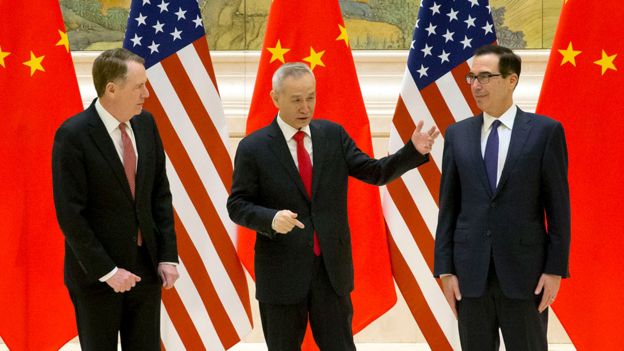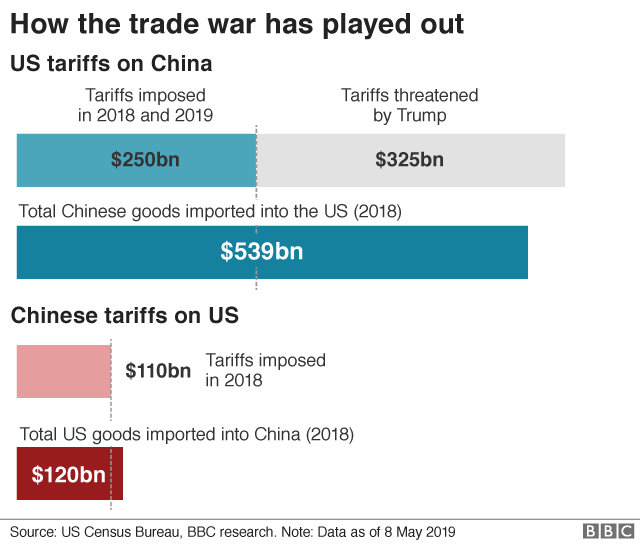
US President Donald Trump said he was in "absolutely no rush" to finalise a trade agreement with China, hours after the US more than doubled tariffs on many Chinese products.
He said bilateral talks, which wrapped up today, had continued in a very "congenial" way.
The US action, a sharp escalation of the countries' damaging trade war, took tariffs on affected Chinese goods to 25% from 10%.
China said it would retaliate.
It said it "deeply regrets" the move and would have to take "necessary counter-measures".
Only recently, the US and China appeared to be close to ending months of trade tensions.
The US has raised tariffs on $200bn (£153.7bn) worth of Chinese imports, while Mr Trump said a process had begun to place the full 25% tariff on a further $325bn of Chinese goods.
The $100bn of tariffs taken in would be used to buy US agricultural goods, which would then be used for "humanitarian assistance", President Trump tweeted.
Critics pointed out on Twitter that it is not China who will pay the taxes, but US importers, and ultimately its consumers.
China's Commerce Ministry confirmed the latest US tariff increase on its website.
"It is hoped that the US and the Chinese sides will work together... to resolve existing problems through co-operation and consultation," it said in a statement.
Chinese stock markets rose on Friday, with the Hang Seng index up less than 1% and the Shanghai Composite more than 3% higher.
However, earlier in the week stock markets had fallen after US President Donald Trump flagged the tariff rise on Sunday.
The US imposed a 10% tariff on $200bn worth of Chinese products - including fish, handbags, clothing and footwear - last year.
The tariff was due to rise at the start of the year, but the increase was delayed as negotiations advanced.
The US-China trade war has weighed on the global economy over the past year and created uncertainty for businesses and consumers.
Even though Mr Trump has downplayed the impact of tariffs on the US economy, the rise is likely to affect some American companies and consumers as firms may pass on some of the cost, analysts said.
Deborah Elms, executive director at the Asian Trade Centre, said: "It's going to be a big shock to the economy.
"Those are all US companies who are suddenly facing a 25% increase in cost, and then you have to remember that the Chinese are going to retaliate."

US and Chinese officials have held several rounds of talks in an attempt to strike a deal
The American Chamber of Commerce in China said: "While we are disappointed that the stakes have been raised, we nevertheless support the ongoing effort by both sides to reach agreement on a strong, enforceable deal that resolves the fundamental, structural issues our members have long faced in China."
French Finance Minister Bruno Le Maire warned that the trade dispute escalation threatened jobs across Europe.
"There is no greater threat to world growth," Mr Le Maire told CNews.
BBC economics correspondent Andrew Walker said the direct impact of the trade dispute would be on the US and China.
He said there was economic research suggesting that US tariffs hit American consumers, not Chinese exporters, as President Trump argues.
There could also be wider implications, he added.
"Any softening of demand among Chinese and American consumers and businesses is likely to affect their suppliers.
"To take some possible examples, China is a key market for metals and energy exporters and for suppliers of industrial machinery such as Germany. The US is a key buyer of consumer goods," our correspondent said.
"These two markets won't dry up, but they could be a little weaker as a result of any economic hit from the tariffs."
No breakthrough, and no deal - just, more tariffs.
With this move, US President Donald Trump has effectively dealt a fresh blow to not just the Chinese economy - as he had presumably hoped - but also to US's.
The previous set of tariffs of 10% on $200bn of Chinese goods have to some extent been absorbed by American importers, but economists say a 25% tariff will be much harder for them to stomach.
They will almost certainly have to pass on that cost to American consumers - and that means higher prices.
Make no mistake, this is a serious escalation - and the trade war between the world's two largest economies is back on.
This means the rest of us should be prepared for more pain ahead.
Mr Trump's tariff increases have taken many businesses in China and America by surprise, fuelling their anxieties about investment and supply chain viability.
Chinese exporters say passing on costs to their US customers may be the only way to compensate for dwindling profit margins.
"The US importers will have to absorb it and transfer it on to consumers," Herbert Lun, a Chinese haircare electronics maker, told the Financial Times.
America's farmers are suffering too. Shipments of soybeans - one of the most valuable US agricultural export crops - to China have slumped.
A combination of higher tariffs and depressed farm commodity prices are putting US farmers under increasing pressure, economists say.
Davie Stephens, a west Kentucky farmer and president of the American Soybean Association, told local media that farmers are "in a desperate situation".
Despite this week's escalation in tensions, talks were held between Chinese Vice-Premier Liu He, US Trade Representative Robert Lighthizer and Treasury Secretary Steven Mnuchin on Thursday.
A White House spokesman said US officials had agreed with the vice-premier to resume talks on Friday morning, according to media reports.
Even though there had been growing optimism about progress in trade talks recently, sticking points have persisted throughout.
These have included issues around intellectual property protection, how fast to roll back tariffs and how to enforce a deal.
Analysts say the Chinese are still willing to negotiate to retain the moral high ground and because they recognise the importance of solving the trade war.
"A trade war will be bad for China, both the real economy and the financial markets. It will also be bad for the world economy," said Gary Hufbauer of the Peterson Institute for International Economics.
"Better for China to play the role of conciliatory statesman than angry retaliator."
China has been a frequent target of Donald Trump's anger, with the US president criticising trade imbalances between the two countries and Chinese intellectual property rules, which he says hobble US companies.
Some in China see the trade war as part of an attempt by the US to curb its rise, with Western governments increasingly nervous about China's growing influence in the world.
Both sides have already imposed tariffs on billions of dollars worth of one another's goods. The situation could become worse still, as Mr Trump has also warned he could "shortly" introduce 25% duties on $325bn of Chinese goods.
What exactly sparked the US president's latest actions, which apparently took China by surprise, is unclear.
Ahead of the discussions, Mr Trump told a rally China "broke the deal" and would pay for it.

The International Monetary Fund said the row posed a "threat to the global economy".
"As we have said before, everybody loses in a protracted trade conflict," the body which aims to ensure global financial stability said in a statement, calling for a "speedy resolution".